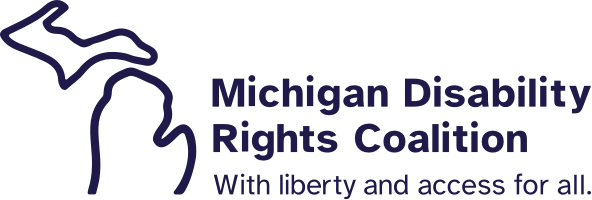Dating, Intimacy, Sex, Disability and AT
Tuesday, January 23, 2018

By Aimee Sterk, LMSW, MATP Team
This week has been a really weird conglomeration of anniversaries and news that are all muddling together in my head. Eleven years ago this week, I went on my first date with my husband. Two years ago this week, we put a deposit down for IVF that led to us having our son after battling infertility and loss for 9 years. In the news this week and this past year, are daily reports of the MSU doctor who sexually assaulted and abused hundreds of female athletes. His trial is ending and victims are making their statements. I was abused by my pediatrician as a child, the ultimate end result being PTSD that was triggered when we had our losses and I had more invasive treatments for the losses and infertility. A series of NPR stories has covered the epidemic of sexual abuse among people with disabilities, especially women with developmental disabilities. My son turned one and my daughter is due in March. I think about protecting them and teaching them about their bodies, safety, and love. Sexual abuse, domestic violence, dating, intimacy, sexual health, they are all on my mind—and I’m being bombarded with information and stories and reminders.

Like many people with disabilities, I started dating much later in life. Understanding and accepting my bi identity along with facing my thoughts about my body and my worth was necessary before I could consider dating. I waited until I was in my 30s. For many reasons, this turned out to be a good thing. While I spent many years feeling like I was unlovable, in the end I grew emotionally and built a life I loved and truly felt like finding a person to love would just be adding to something that was already pretty awesome. Ultimately, finding and marrying my husband and having children with him was the best thing that has ever happened to me. These experiences have been the very best in my life. I’ve also endured the very worst experiences of my life together with him. Dating, love, marriage—these are things that many people want to experience. With disabilities, there are extra complications and oppression.
Kristy Liddiard, in her work to face and rid ourselves of shame experienced by women with disabilities around the areas of sex and intimacy encourages us, “ …This can only happen by sharing our stories, lives and experiences. Stories can – if voiced and heard – be productive, useful, and valuable. Stories can define a place and people. They offer a sense of collective experience; a means to claim space, foster a positive identities and experiences, and demand social and sexual justice. Collectively, telling and sharing our stories is how we can build sexual cultures and communities as we want them; ones which fit all of our bodies, pleasures and desires; ones which empower rather than oppress. So, what’s your sexual story?”
Samantha Evans agrees, “From the issue of privacy in shared living or with carers, to conditions, medications and treatments making sex difficult, the discussion of sex and disability shouldn’t be shied away from.”
So, let’s take a look at just the tip of this iceberg of taboo around dating, sex, and disability. To start with, dating, there’s a great article about some myths of online dating with a disability in Psychology Today. Dating apps and websites provide a great option for people with disabilities to get into dating. I had my share of frustrations with online dating when I met my husband—I told him I was shutting down my profile and giving up and gave him my email address. That said, it did actually work out and this was very early in the online dating scene. When accessible, these platforms provide a way of meeting lots of people you wouldn’t run into in everyday life to cast a wider net. While there are sites to just connect with other people with disabilities, OKCupid, Tinder, and other mainstream sites are also open to people with disabilities. Choosing to disclose your disability is a big decision. I am quite open about my disabilities so like Emily Landau, I discussed my disabilities and other target identities early and often when online dating. Emily’s piece in the New York Times talks about authenticity and rejection and her decision to disclose when online dating. This is something to consider before creating a profile, or like her, it may be something that evolves.
Getting to know each other and intimacy are a big chunk of the dating framework and how long those last before moving into sexual intimacy is entirely personal. I’m not really coming up with wisdom, advice, or AT for building intimacy right now, so I’ll jump right into sex.
People with disabilities are often left out of sex ed classes. This is a huge disservice to us. Surprise! Many people with disabilities do have sex. We need to know how our bodies work and talk about healthy relationships. We also need information on safe sex, pregnancy prevention, and consent. More and more, this information is being shared, but for many of us that are long out of school, we need to seek out other resources. Here are a few:
- The Ultimate Guide to Sex and Disability (book)
- Ability Tools Blog about AT for sex
- Disability and Sex Toys
- Assistive Technology wiki on sex positioners with resources for disabilities and sexual intimacy
All the articles I can find on AT for sexual intimacy focus on physical disabilities, and many commentaries are mostly assuming people are interested in heterosexual intimacy and sex. If you know of resources for AT and sexual intimacy for LGBTQIA people with disabilities, or mental health, sensory, or cognitive disabilities, please share them!
I can’t end this article without some resources on domestic violence and sexual assault. People with disabilities are far more often targets and victims of domestic violence and sexual assault. Key points here for me: it is never your fault and there is help available. We all must work together to end abuse of people with disabilities.
While my journey to find intimacy, love, and sex has had many detours and obstacles, ultimately loving and finding myself, seeing and appreciating my disabilities, and understanding and honoring myself as a sexual human being all have led me to my “fairytale” (for now at least) ending. Online dating was a key piece of AT that I used to address anxiety, meet a variety of people, and explore relationship building in a relatively safe environment. In addition, resources AT for sexual intimacy are also available. As Valentines’ Day approaches, perhaps you are thinking about finding love and/or sexual partners. Hopefully these resources are helpful.

